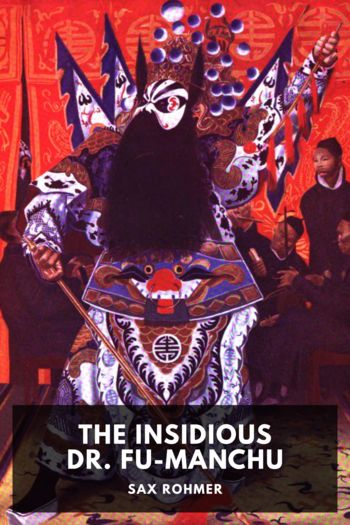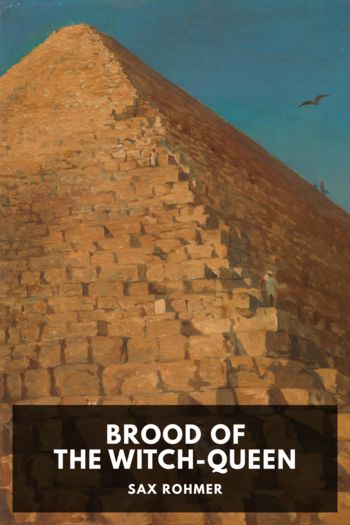The Insidious Dr. Fu-Manchu - Sax Rohmer (best finance books of all time .TXT) 📗

- Author: Sax Rohmer
Book online «The Insidious Dr. Fu-Manchu - Sax Rohmer (best finance books of all time .TXT) 📗». Author Sax Rohmer
“Where?”
Nayland Smith rapped out the question violently, turning in a flash from the picture which he was examining.
“In this room!” she whispered glancing furtively, affrightedly about her. “Something tells Aziz when he is near—and I, too, feel strangely afraid. Oh, can it be that he is not dead!”
She held my arm tightly. Her brother was searching the room with big, velvet black eyes. I studied the faces of the several visitors; and Smith was staring about him with the old alert look, and tugging nervously at the lobe of his ear. The name of the giant foe of the white race instantaneously had strung him up to a pitch of supreme intensity.
Our united scrutinies discovered no figure which could have been that of the Chinese doctor. Who could mistake that long, gaunt shape, with the high, mummy-like shoulders, and the indescribable gait, which I can only liken to that of an awkward cat?
Then, over the heads of a group of people who stood by the doorway, I saw Smith peering at someone—at someone who passed across the outer room. Stepping aside, I, too, obtained a glimpse of this person.
As I saw him, he was a tall, old man, wearing a black Inverness coat and a rather shabby silk hat. He had long white hair and a patriarchal beard, wore smoked glasses and walked slowly, leaning upon a stick.
Smith’s gaunt face paled. With a rapid glance at Karamanèh, he made off across the room.
Could it be Dr. Fu-Manchu?
Many days had passed since, already half-choked by Inspector Weymouth’s iron grip, Fu-Manchu, before our own eyes, had been swallowed up by the Thames. Even now men were seeking his body, and that of his last victim. Nor had we left any stone unturned. Acting upon information furnished by Karamanèh, the police had searched every known haunt of the murder group. But everything pointed to the fact that the group was disbanded and dispersed; that the lord of strange deaths who had ruled it was no more.
Yet Smith was not satisfied. Neither, let me confess, was I. Every port was watched; and in suspected districts a kind of house-to-house patrol had been instituted. Unknown to the great public, in those days a secret war waged—a war in which all the available forces of the authorities took the field against one man! But that one man was the evil of the East incarnate.
When we rejoined him, Nayland Smith was talking to the commissionaire at the door. He turned to me.
“That is Professor Jenner Monde,” he said. “The sergeant, here, knows him well.”
The name of the celebrated Orientalist of course was familiar to me, although I had never before set eyes upon him.
“The Professor was out East the last time I was there, sir,” stated the commissionaire. “I often used to see him. But he’s an eccentric old gentleman. Seems to live in a world of his own. He’s recently back from China, I think.”
Nayland Smith stood clicking his teeth together in irritable hesitation. I heard Karamanèh sigh, and, looking at her, I saw that her cheeks were regaining their natural color.
She smiled in pathetic apology.
“If he was here he is gone,” she said. “I am not afraid now.”
Smith thanked the commissionaire for his information and we quitted the gallery.
“Professor Jenner Monde,” muttered my friend, “has lived so long in China as almost to be a Chinaman. I have never met him—never seen him, before; but I wonder—”
“You wonder what, Smith?”
“I wonder if he could possibly be an ally, of the Doctor’s!”
I stared at him in amazement.
“If we are to attach any importance to the incident at all,” I said, “we must remember that the boy’s impression—and Karamanèh’s—was that Fu-Manchu was present in person.”
“I do attach importance to the incident, Petrie; they are naturally sensitive to such impressions. But I doubt if even the abnormal organization of Aziz could distinguish between the hidden presence of a creature of the Doctor’s and that of the Doctor himself. I shall make a point of calling upon Professor Jenner Monde.”
But Fate had ordained that much should happen ere Smith made his proposed call upon the Professor.
Karamanèh and her brother safely lodged in their hotel (which was watched night and day by four men under Smith’s orders), we returned to my quiet suburban rooms.
“First,” said Smith, “let us see what we can find out respecting Professor Monde.”
He went to the telephone and called up New Scotland Yard. There followed some little delay before the requisite information was obtained. Finally, however, we learned that the Professor was something of a recluse, having few acquaintances, and fewer friends.
He lived alone in chambers in New Inn Court, Carey Street. A charwoman did such cleaning as was considered necessary by the Professor, who employed no regular domestic. When he was in London he might be seen fairly frequently at the British Museum, where his shabby figure was familiar to the officials. When he was not in London—that is, during the greater part of each year—no one knew where he went. He never left any address to which letters might be forwarded.
“How long has he been in London now?” asked Smith.
So far as could be ascertained from New Inn Court (replied Scotland Yard) roughly a week.
My friend left the telephone and began restlessly to pace the room. The charred briar was produced and stuffed with that broad cut Latakia mixture of which Nayland Smith consumed close upon a pound a week. He was one of those untidy smokers who leave tangled tufts hanging from the pipe-bowl and when they light up strew the floor with smoldering fragments.
A ringing came, and shortly afterwards a girl entered.
“Mr. James Weymouth to see you, sir.”
“Hullo!” rapped Smith. “What’s this?”
Weymouth entered, big and florid, and in some respects singularly like his brother, in others as singularly unlike. Now, in his black suit, he was a somber figure; and in the blue eyes I read a fear suppressed.
“Mr. Smith,” he began, “there’s something uncanny going on at Maple Cottage.”
Smith wheeled the big armchair





Comments (0)